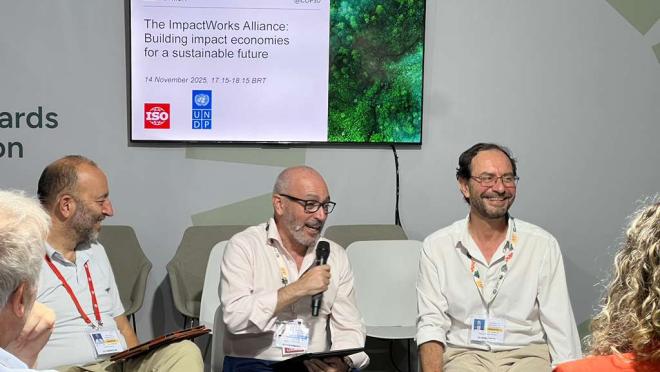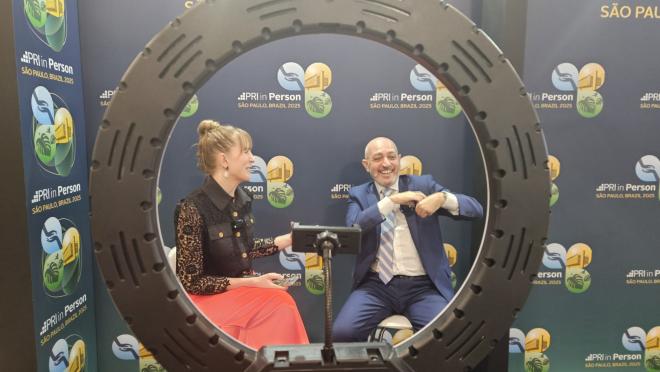On 10 October 2024, Fabienne Michaux, Director of SDG Impact at UNDP’s Sustainable Finance Hub, delivered a keynote address at the Mizuho Impact Forum in Tokyo. Her speech, titled "Global Trends in Impact Investment," explored how the shift towards impact-driven financial markets is reshaping corporate value and sustainability. Addressing a diverse audience, Ms. Michaux emphasized the importance of aligning business strategies with environmental and social impact for long-term success in the evolving global economy.
Read the full speech below:
Mr Ushikubo,
Distinguished guests,
Ladies and Gentlemen,
I would like to first thank Mizuho Financial Group for organizing today’s event and for inviting me to participate.
It is a pleasure to be back in Japan and talking with you today about global trends in impact investment and implications for organizations as financial markets shift towards a more impact driven approach to corporate value, and what UNDP is doing to help accelerate and support this shift.
An Increasingly Sustainability-Aware World
We can all sense that our world is changing rapidly, and financial markets are evolving in response.
We are surrounded by daily reminders of how social-environmental challenges are increasingly impacting on our wellbeing – in economic as well as broader terms.
Among them, climate change, food insecurity, and increased poverty exacerbated by the pandemic, increasing levels of social and geopolitical unrest, and growing anxiety especially amongst our young people.
Progress towards achieving the sustainable development goals has stalled – with less than 17% of SDG targets on track for achievement by 2030.
Swiss Re Institute modeling estimates that global GDP could be reduced by up to 18% by 2050 if no action is taken to mitigate climate change.
Already, every hour the global economy loses US$16 million due to climate impacts alone.
Biodiversity loss and resultant declines in ecosystem services could cost the global economy close to US$500 billion a year by the middle of the century.
Poverty limits economic growth potential and inequality stifles growth.
A study by the International Monetary Fund (IMF) found that if the income share of the bottom 20% of a country’s population increases, the country's GDP growth is higher, but when the income share of the top 20% rises, growth slows. Concerning since in many countries trends at both ends of the spectrum are moving in the wrong direction.
The New Normal for Investment and Corporate Value
Sustainability is a long-term mega trend and managing for impact will increasingly shape financial markets and corporate value as businesses, investors and institutions increasingly recognize that future financial success and social-environmental impacts are deeply intertwined.
There is growing awareness that long-term value creation will not come from short-term profit maximization.
Instead, it will stem from building and investing in resilient, sustainable businesses that generate both financial returns and social-environmental value.
Companies and investors that fail to adapt to this reality will face reputational risks, stranded assets, dwindling customer bases, and lower long-term valuations and investment returns.
Collectively, staying on the short-term profit maximization merry-go-round for too long may backfire and have serious long-term consequences for us all.
The paradigm shift towards a more sustainable future is already prompting significant changes in both corporate strategies and investment practices.
Availability and cost of capital – whether provided by capital markets or financial institutions - is increasingly being linked to ESG or sustainability related metrics and performance.
CSR, ESG, shared value creation, sustainable business models, integrated thinking and reporting, sustainable finance, green bonds, social impact bonds, impact investment – I could go on – are all variations on the same theme, and indications reflecting a growing consensus that sustainability and positive impact are not only good for the environment and society but also essential for long-term economic success.
For its part, UNDP is aiming to redirect US$430 billion in global private wealth towards achieving the SDGs as part of its trillion dollar moonshot by promoting the alignment of business and investment decisions and capital with economic, social and environmental value.
To achieve this moonshot, UNDP will leverage its’ on the ground presence in more than 170 countries, trusted advisor relationships with government and other stakeholders, and convening power to bridge the gap between private and public sectors to transform finance and the global economic and financial architecture to consider people and the planet alongside financial return.
The introduction of mandatory regulatory disclosure and conduct requirements are also hastening this process – especially in Europe with the introduction of The Sustainable Finance Disclosure Regulation (SFDR), Corporate Sustainability Reporting Directive (CSRD), and Corporate Sustainability Due Diligence Directive (CSDDD) that are pushing European investors and companies — and entities outside Europe but part of European value chains — to not only consider responsible business conduct and investing but to also define it clearly and report transparently.
As an example of how UNDP is putting its convening power to use, it is spearheading through its Financial Centres for Sustainability (FC4S) unit a partnership with Global Reporting Initiative (GRI), GSG Impact, IFRS Foundation and the International Organization for Standardisation (ISO) to launch Sustainability Disclosure and Management Hubs in 14 developing and emerging economies.
The hubs are designed to enhance sustainability disclosure and management by supporting capacity building, aligning with national development priorities, offering stock exchange guidance, and fostering regulatory development. The collaboration aims to facilitate the adoption of global sustainability related reporting standards, including IFRS S1 and S2, GRI Standards and internal management standards from ISO and UNDP.
But out of this busy landscape I want to zoom in today on the important role that impact investment is playing in this transition.
Size, Characteristics and Challenges in the Global Impact Investment Market
Currently, the global impact investment market is valued at around $1 trillion USD.
According to the Global Impact Investing Network’s annual survey of impact investors (GIIN):
- Asset allocation to impact strategies has grown at a compound annual growth rate of 14% over the past five years.
- But investment has been stronger in developed markets which have increased by 29% over the same period, compared to an 8% rise in emerging markets.
- While the number of deals has decreased, the average deal size has grown by 7%, indicating the steady march towards mainstreaming.
- Nearly three-quarters of investors are pursuing risk-adjusted market-rate returns alongside social impact.
Increasingly the impact investing community is turning its mind to solving for significant challenges:
- First, scaling — both in terms of capital deployment and geographic reach.
- Second, making more capital reach low-income or emerging markets where it's needed most.
- And third, impact measurement and management. Despite the gains in IMM that have been made, there's still much to be done. While incorporating financial metrics into decision making and measuring financial performance is straightforward, integrating impact considerations into business and investment decision making and assessing impact results remains more elusive.
Impact Investment at Forefront of Paradigm Shift and System Change
Impact investment may comprise only a small fraction of the $100 trillion+ global investment market, yet its influence is disproportionate to its size.
The impact investing community is at the vanguard of our increasingly sustainability-aware world. Impact investing has become the testing ground for innovation, laying the foundation for future mainstream financial models, tools and capacity building that prioritize people, planet, and prosperity alongside financial sustainability.
Many paths have led people to impact investment, but with a shared vision of creating a financial and economic system that serves humanity and the planet rather than the other way around.
For me it was witnessing and reflecting on the impacts of in particular the Asian Financial Crisis and the US sub-prime crisis from my vantage point as a credit analyst at S&P.
The creation of the Global Steering Group for Impact Investment and the resulting global community of practice and network of national advisory boards have been instrumental in underpinning its influence and contribution towards the wider transition in play and I am delighted by the appointment of Elizabeth Boggs Davidsen - my predecessor, and more lately Vice President of the Office of Development Policy at the US International Development Finance Corporation to the role of CEO at GSG Impact.
So too, the creation of shared language and approach developed through the Impact Management Project, which has spurred much collaboration and cooperation amongst individuals and organizations worldwide.
UNDP’s Sustainable Finance Hub has strong links with the impact investment community, including being an active participant in the Impact Management Platform, and before it the Impact Management Project’s Structured Network of standard setters – from which our SDG Impact initiative was born and many strong collaborations have resulted.
Among them are an MOU with GSG Impact, now in its second generation, the collaboration with OECD on the OECD-UNDP Impact Standard for Financing Sustainable Development, the partnership with SVI to deliver the SDG Impact Train-the-trainer program, strong ties with GRI, and the partnership with ISO, which has already resulted in the release of the ISO-UNDP Guidelines for Contributing to the SDGs based on, and conceptually aligned with UNDP’s SDG Impact Standards but recast in ISO language and within ISO’s high level structure for management system standards.
Impact as a Driver of Innovation
Impact investment is fueling innovation in financial markets.
New financial instruments — such as green bonds, sustainability-linked loans and bonds, and social impact bonds — are channelling capital toward sustainable business models.
Blended finance is enabling projects with uncertain financial returns but high social or environmental potential to attract private capital, with public and philanthropic funds helping to mitigate risk.
Businesses are also innovating their strategies, shifting from traditional profit-driven models to more inclusive and stakeholder-focused approaches.
Companies that embed sustainability and impact management into their operations are not only attracting more capital but are also retaining talent and building strong customer loyalty.
UNDP’s Sustainable Finance Hub is working to accelerate these developments and support organizations taking a leading role in the transition.
Through its Policy and Institutional Work, including its work with governments on developing their Integrated National Financing Frameworks for the SDGs and in its role as Secretariat for the G20 Sustainable Finance Working Group, UNDP is helping to:
- Strengthen policies and institutions to reduce barriers and risks for investors;
- Facilitating public-private collaboration to create conducive investment environments; and
- Building institutional capacity to support and regulate sustainable investments.
Through its Private Finance for the SDGs unit, UNDP is:
- Promoting financial instruments such as green bonds, blue bonds, social impact bonds and blended finance;
- Strengthening impact management capability and performance through improved practices for aligning financial flows with sustainable development outcomes through its IMM advisory services and the SDG Impact Standards, training and soon to launched assurance scheme;
- Providing access to market intelligence on SDG aligned investment opportunity areas through its SDG Investor Platform – which has identified 600+ investment opportunity areas across 45 markets;
- Working with partners on post map activation to translate identified investment opportunity areas into investment pipeline;
- Capacity building – including 35000+ learners enrolled in our Impact Measurement and Management for the SDGs course developed with Duke University, and development of the SDG Impact Accredited Trainer community of practice, now more than 70 strong ready to deliver training on the SDG Impact standards in 21 languages across 34 countries.
Conclusion: The Future of Corporate Value in an Impact-Driven World
To conclude,
The shift toward impact-driven investment and corporate value is not just a passing trend — it is the future of finance.
We are witnessing the rise of a new financial system that recognizes sustainability as fundamental to long-term value creation, both for shareholders and society.
While the impact investment market may still be small compared to the global financial system, its influence is undeniable.
It is setting the stage for a new economic order where financial success is inextricably linked to positive societal outcomes.
The challenges are real, but the momentum and direction of travel are undeniable.
As markets, businesses, and investors embrace this new paradigm, those who innovate and adapt will find themselves at the forefront of the future economy.
Financial success and societal and environmental good are no longer mutually exclusive — they are one and the same. And the time to act is now.
And we at UNDP look forward to continuing to forge stronger ties with the private sector to support this transition and accelerate the mobilization of private capital for the SDGs and a more inclusive, sustainable, and resilient future for us all.
Thank you.


















